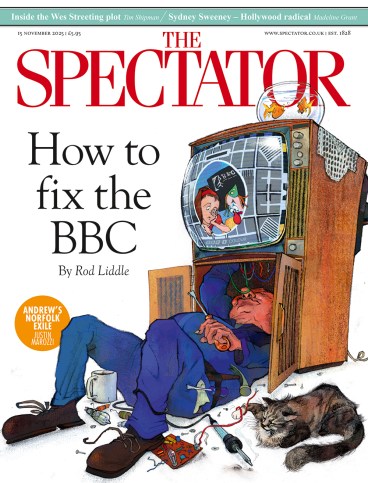
One morning a few months ago I was walking past St James’s Park station when a dishevelled man with his fists clenched stepped into my path without warning. He stared at me furiously and blocked my path, body almost shaking. For a few tense seconds he stood there before I crossed the road to get away from him.
‘Most rough sleepers are harmless and vulnerable, but a small minority are violent’
When I told friends who work in central London about this incident, I was shocked at how typical my experience was. For people who commute into Westminster, it is becoming commonplace to be spat at, lunged at and screamed at to ‘fuck off’ by individuals who appear to be high on illegal drugs. One colleague told me she had been threatened with a knife by one such individual and forced to take money out from a cashpoint.
On Victoria Street, you can regularly see up to 20 or 30 rough sleepers, mostly under a sheltered colonnade on the south side of the road. Other hotspots in the borough include Strutton Ground, which hosts a food market, and the streets surrounding Westminster cathedral. To drug dealers, Victoria Street is known as the ‘Golden Mile’, thanks to a confluence of customers and an under-resourced local law enforcement. Dealers will travel from as far away as Croydon to sell here. Rough sleeping is a long-standing issue in the area, but every person I spoke to, including local councillors and charity workers, said the problem had become much worse in the past few years.
This is backed up by the data. Westminster has experienced an explosion in rough sleeping. The number of people bedding down on its streets jumped by around 25 per cent between June 2024 and June 2025. In June this year, 355 people were sleeping rough in this one borough – a startling figure; more than double the tally from 2021. Westminster alone now accounts for around a fifth of all rough sleepers in London.
It is not just a question of numbers. The behaviour of these individuals seems to have become increasingly erratic. Several people I spoke to mentioned seeing homeless people in this area doing the so-called ‘Fentanyl fold’, which is a common sight in North American cities where the usage of synthetic opioids is prevalent. Users slump forward with their heads bowed down and seem unresponsive to the outside world. In 2023, the government began tracking data related to deaths from synthetic opioids, because the police and health officials were concerned that a similar crisis may be brewing in Britain. Between 2019 and 2024 the number of drug-related deaths in England and Wales increased by 27 per cent. In a single year, 2023/2024, the number of drug-related deaths linked to nitazene, a synthetic opioid, increased by a factor of four.
People can be seen openly taking drugs in Westminster, with abusers smoking pipes and even injecting themselves in the street. Some of the afflicted individuals show signs of necrosis, the medical term which describes the bleeding sores and rotting flesh that heavy drug users experience because their drugs have been cut with xylazine, a sedative that restricts blood flow. The resulting wounds can become infected. In extreme cases limbs have to be amputated.
Several factors make Westminster a hotspot for rough sleepers. It is home to four major rail stations – Charing Cross, Marylebone, Paddington and Victoria, as well as Victoria coach station – which all act as gateways for newcomers arriving in the city. Only 37 per cent of Westminster’s rough sleepers are UK nationals. The rest are predominantly foreigners drawn by the borough’s charity services.
Westminster is also attractive for prospective panhandlers. The bustling streets – thronged with tourists, civil servants and MPs – are a target-rich environment for begging. A study by Westminster council in 2007 estimated that beggars were earning up to £280 per day, which would equate to £476 in today’s money. Westminster cathedral, the largest Catholic church in England and Wales, is another pull factor, as churchgoers are more likely to give generously to beggars. In August, the Daily Mail reported that cocaine is being sold by dealers inside the cathedral.
With the repeal of the Vagrancy Act, every street could be vulnerable to
the emergence of shanty towns
This magnet effect is reinforced by Westminster’s generous provision of homeless support. The area hosts many day centres, soup kitchens and night shelters, including King George’s Hostel on Great Peter Street, one of the few hostels in London which permits drug users and men with dogs to stay. In June, a petition was created by local residents to have the hostel shut down, citing violent fights with weapons, drug use, public urination and even ‘foul-smelling waste on our doorsteps’ which makes ‘residents feel unsafe in their own homes’.
‘In the past year things have deteriorated so sharply that some residents’ associations have paid for private security,’ says David Harvey, Westminster Conservative councillor. ‘Most rough sleepers are harmless and vulnerable, but a small minority who are violent and ongoing drug activity have made people feel unsafe… It’s not only for themselves, but also for the rough sleepers and the charity workers trying to help them.’
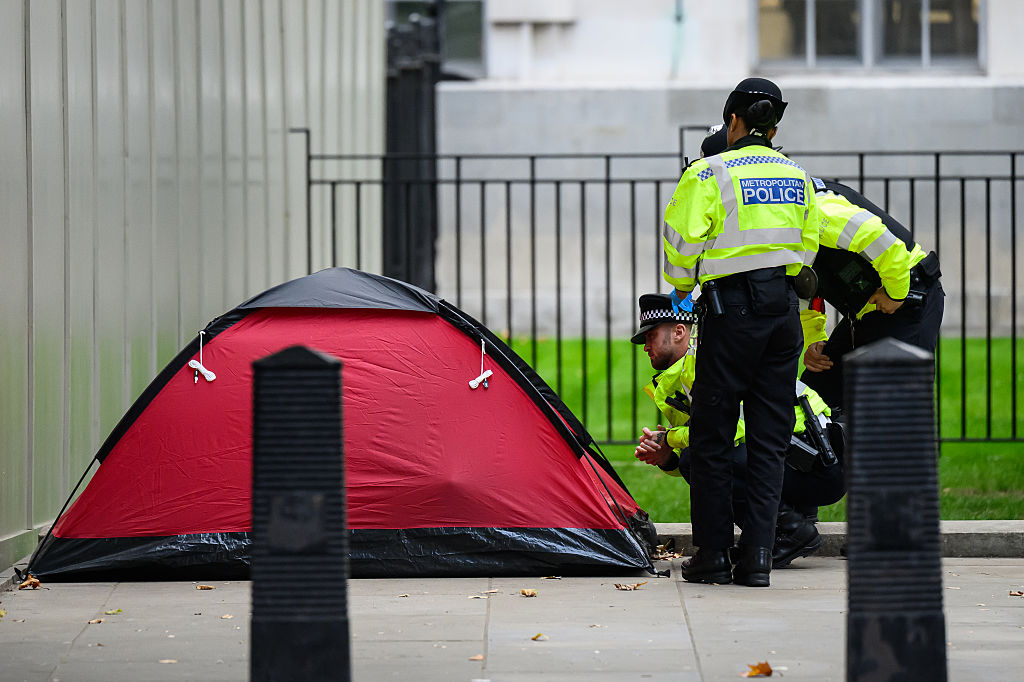
Although Westminster’s vagrancy problem is not representative of the national picture, it foreshadows how many urban environments of the country could look in the near future, as progressive approaches to managing homelessness – namely, the decriminalisation of rough sleeping and of drug use – are enacted at the behest of charities and left-wing politicians.
Last year’s Labour manifesto promised to create a ‘cross-government strategy’ to ‘put Britain back on track to ending homelessness’. After a year in power, the government’s only substantive change is the announcement that it would decriminalise rough sleeping by scrapping the Vagrancy Act of 1824, to take effect in spring next year. The then deputy prime minister Angela Rayner said: ‘We are drawing a line under nearly two centuries of injustice towards some of the most vulnerable in society, who deserve dignity and support.’ This came with funding – an extra £233 million for homelessness services, bringing total spending close to £1 billion for 2025-26.
The risk is that taking away the power police have to move people on from public spaces will allow rough sleepers to gather into fixed encampments. This is already a problem on parts of land owned by Transport for London (TfL), where there has been a reluctance to use the Vagrancy Act. Park Lane in Westminster has a recurring issue with these encampments because TfL owns a strip of land here, and has to spend hundreds of thousands of pounds on removal orders and private security to prevent tents going up. Paul Fisher, another local Conservative councillor, who has been critical of TfL’s lethargy when it comes to encampments on Park Lane, tells me that residents were finding empty bags and wallets dumped in their back gardens by these groups. When the repeal of the Vagrancy Act takes effect, practically every street could be vulnerable to the emergence of these shanty towns.
Then there is drug policy. Sadiq Khan, who pledged to end rough sleeping in London by 2030, has also called for the decriminalisation of cannabis. At the start of the year, the Green party introduced a motion to the London Assembly calling for a pilot scheme for legal drug consumption rooms. This was voted down, but given the recent success of Zack Polanski’s party in the polls, it is not inconceivable that other cities will adopt these harm-reduction strategies. In Glasgow, Britain’s first legal drug consumption facility opened at the beginning of the year.
Before we embark on a programme of decriminalisation, both of vagrancy and drugs, it is worth examining how this has played out in progressive cities in North America. Well-meaning decriminalisation efforts in San Francisco have backfired. In 2018, a landmark ruling by the Ninth Circuit made it illegal for many western states to conduct homeless sweeps unless sufficient shelter beds were available – a ruling which was eventually overturned by the Supreme Court in 2024. Four years earlier, California voted to decriminalise possession of small amounts of drugs. By the end of the decade, there was an explosion of open-air drug markets and tent encampments and downtown San Francisco became internationally notorious: a place where fentanyl can be bought and smoked openly on the sidewalk, and where overdose victims drop dead in record numbers.
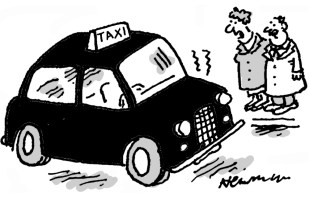
San Francisco has begun to turn the corner. Daniel Lurie, a moderate Democrat who ran on a platform of ending homelessness and drug-related crime, became mayor in January. Under his direction the police have prioritised enforcing the law against theft and arresting drug dealers. Overdose deaths have decreased by 39 per cent since he took office. Homeless encampments have fallen to pre-pandemic levels. Though these changes are undoubtedly for the better, it is a shame that the residents of San Francisco had to endure so many years of depredations – open defecation, harassment, dead bodies in the street – before a political solution to the problem was made available.
Britain, in so many respects, trails behind the US in political fashions. We have, so far, avoided the worst excesses of liberal North American jurisdictions in creating homeless shanty towns equivalent to The Tenderloin in San Francisco, Skid Row in Los Angeles or East Hastings Street in Vancouver. The incumbent government, for all its flaws, has adopted a robust stance against drug decriminalisation. We have not experimented with the explicit legalisation of cannabis, as many US states have, and nor do we have a crisis with opioid addiction on a similar scale, because the medical establishment is more careful when it comes to prescribing painkillers.
That Westminster is deluged with rough sleepers with acute drug problems is, in one sense, a national embarrassment – but it should also remind people at the centre of power of the risks of confusing tolerance with neglect.

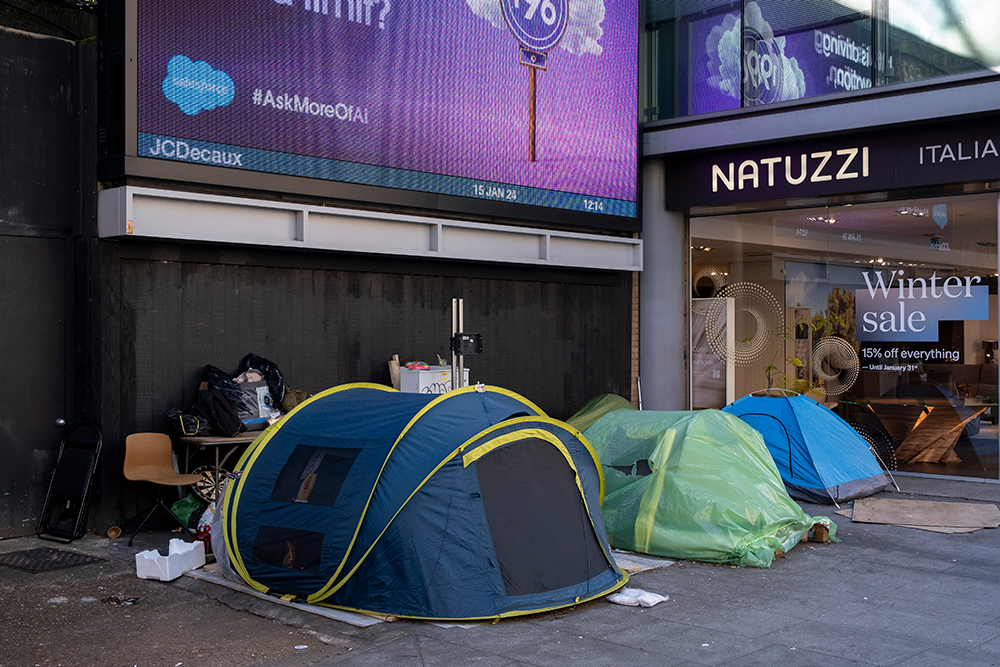

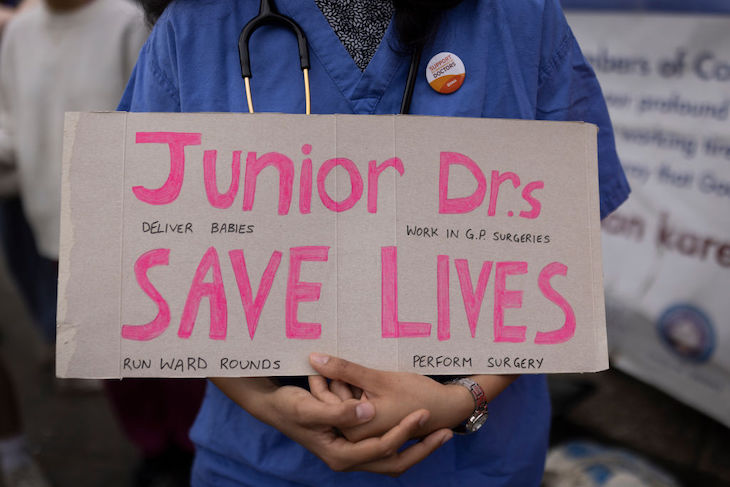




Comments